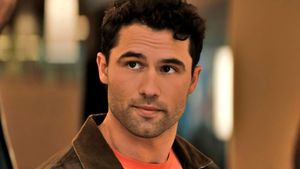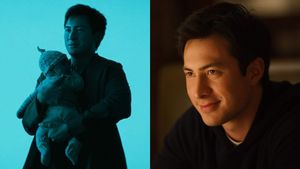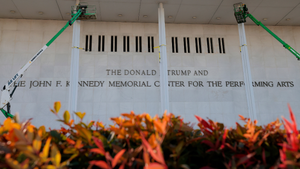Jewish
Theological Seminary of America, the prime school of
Judaism's Conservative branch, named a layman Monday
as its new chancellor: Stanford University religion
department chair Arnold M. Eisen.
Eisen is only the second nonrabbi to lead the
120-year-old rabbinical training school, located in
New York City. He said in a telephone interview that
he personally supports ordaining openly gay seminarians,
though he'll abide by whatever the movement decides
regarding the contentious issue.
Eisen, 54, succeeds Rabbi Ismar Schorsch, who is
retiring in June after 20 years as chancellor of the
seminary. Eisen will be chancellor-designate for a
year while concluding commitments at Stanford and
avoiding a move during his son's senior year in high school.
He'll take over full-time duties in July 2007.
Eisen had not previously identified with either
side in Conservatism's looming showdown over ordaining
gays. The Rabbinical Assembly's committee on Jewish
law has postponed proposing any decision on the contentious
issue until at least December.
Eisen said it's important that the committee,
the Conservative rabbinate, and the seminary faculty
conduct a thorough examination of traditional
religious law "with mutual respect." "My own personal point
of view is, I would vote in favor of gay and lesbian
ordination," he said, but it "could be I'll be outvoted."
He said he hasn't taken any public stand before,
and the seminary's search committee did not make the
issue a "litmus test" in assessing candidates. He
plans to keep his opinion private on the related
question of ceremonies for same-sex couples because, Eisen
said, that's for rabbis to decide.
Reform and Reconstructionist Judaism are liberal
on gay relationships, while Orthodoxy is steadfastly
opposed on the basis of the Bible and Talmud.
Conservative Judaism positions itself as a middle path
between Orthodoxy's strict traditionalism and Reform's
liberal approach to religious law.
Conservative Judaism, with about 760 synagogues
in the United States and Canada, has been concerned
about declining membership and weakening identity.
Eisen said "we have a numbers problem" but so do other
religious institutions at a time when "getting people to
join or regularly attend anything is hard."
"I can't get upset by a slight loss of numbers
if it's made up for by a gain in quality," he said.
Eisen is a leading analyst of the effects of
secularization and other modern trends on U.S.
Judaism. His books include Rethinking Modern Judaism,
The Chosen People in America, Taking Hold of
Torah: Jewish Commitment and Community in
America, and the coauthored The Jew Within:
Self, Family, and Community in America.
In a 2000 lecture, Eisen noted that large
numbers of Jews do not observe the faith's tenets or
practices. "In the long term, this tendency spells
disaster," he said.
Eisen earned bachelor's degrees from the
University of Pennsylvania and Oxford University and a
Ph.D. from the Hebrew University of Jerusalem. Besides
Stanford, he has taught at Tel Aviv University and Columbia
University. (AP)




































































Charlie Kirk DID say stoning gay people was the 'perfect law' — and these other heinous quotes